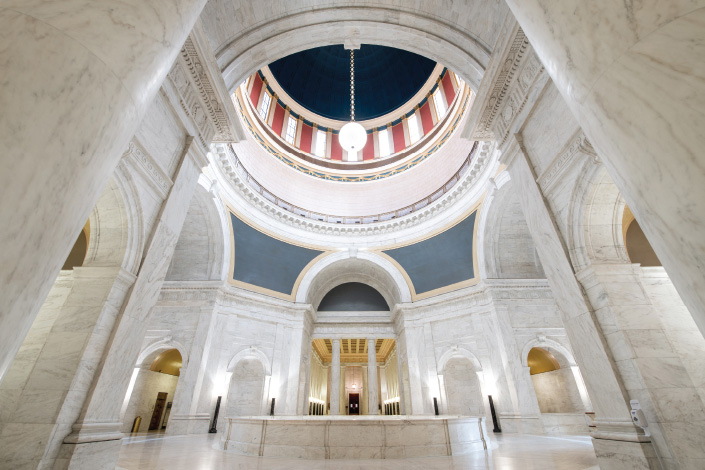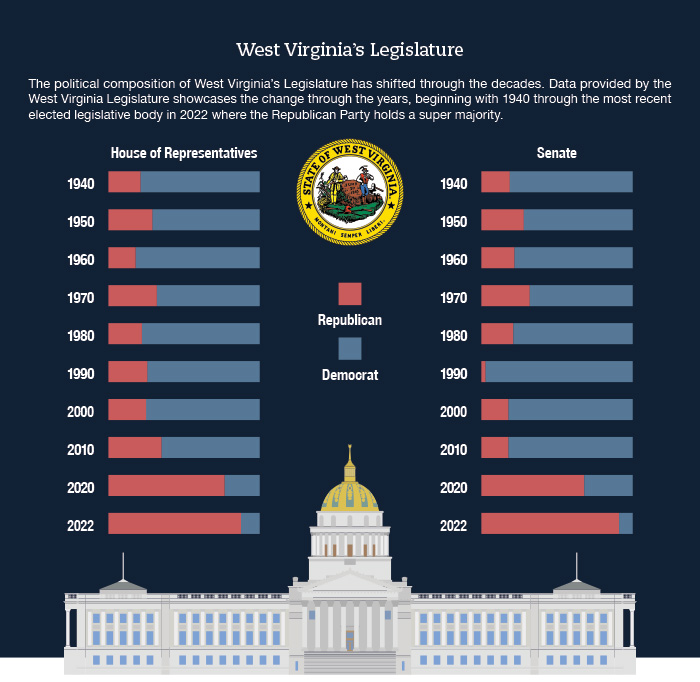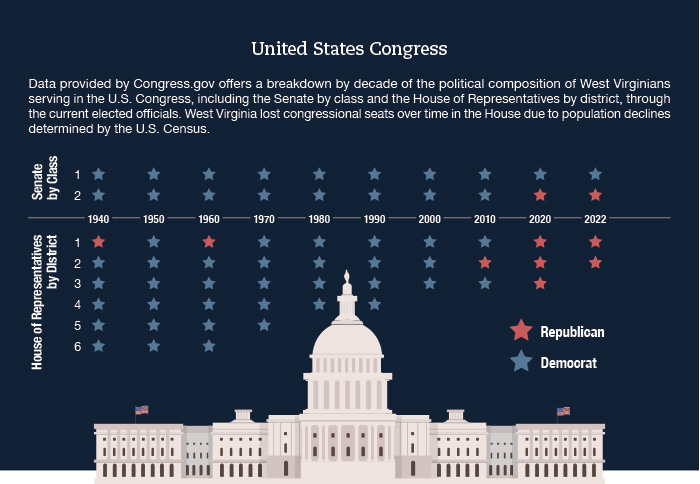The Changing Tide of West Virginia Politics
By Anna Moore
The year is 2000. Texas’ republican Governor George W. Bush was just elected president by a narrow margin defeating democrat incumbent Vice President Al Gore of Tennessee. Republican Cecil Underwood is nearing the end of his term as governor in West Virginia where the democrats hold a 28-6 super majority in the Senate and a 75-25 super majority in the House. Republican Shelley Moore Capito just narrowly defeated democrat lawyer Jim Humphreys in the 2nd District congressional race. Was this the start of a political shift in the historically blue Mountain State? Hoppy Kercheval, radio host of MetroNews Talkline, believes it was.
“Bush campaigned hard in West Virginia in the closing weeks, while Gore ignored the state. Bush carried West Virginia, becoming the first non-incumbent republican presidential candidate to win West Virginia since Herbert Hoover in 1928,” says Kercheval. “Notably, if Gore had won West Virginia, he would have had enough electoral votes to win the election and Florida would not have mattered.”
Kercheval also considers Capito’s victory as breaking the democratic stronghold on congressional seats as most of the state’s congressional leaders were democrat from 1958 until her term began in 2001.
“Nationally, the Democratic Party was trending further to the left, while the influence of labor unions in West Virginia politics was diminishing. Moderate to conservative democratic voters, including Christian conservatives in West Virginia, felt they were being left behind,” he says. “The Republican Party rebuilt during the early 2000s. It worked hard to recruit candidates and win elections. Capito was a major factor in that effort. The tide continued to turn, as republicans increased voter registration and picked up seats in the House and Senate.”
A lot can happen in 23 years. In 2023, republicans have what Kercheval refers to as super-duper majorities, as they hold 88 of the 100 seats in the state House and 31 of 34 seats in the state Senate. The governor, secretary of state, attorney general, auditor and treasurer are also notably republican. Three of four congressional seats remain republican. With this much red influence, what does that mean for the future of West Virginia politics and how will that impact future elections and legislation?
From around the 1930s through the 1990s, West Virginia was a recognizably blue state. Some say this blue wave was created by national politics of the time.
“What led to our democratic history, especially in the ‘30s and then into the next few decades, was the popularity of Franklin Roosevelt and his policies that helped us out of the Depression,” says Mike Pushkin, chairman of the West Virginia Democratic Party. “We have been a state with a lot of poverty and suffered greatly in the Depression, so Roosevelt’s policies were very attractive to the public.”
For the next six decades, West Virginia remained a supporter of the New Deal coalition that began with Roosevelt.
“Democratic voter registration soared, while the number of registered republicans dwindled. During that time, the powerful labor unions—especially the United Mine Workers—helped sustain the democratic majorities in local and statewide elections,” says Kercheval. “John F. Kennedy famously won the democratic primary for U.S. president in West Virginia in 1960, further solidifying the democrats’ lock on the state.”
National politics seem to impact people’s way of life locally. West Virginians, especially in recent times, tend to take a populist approach to their politics with a focus on the economy and policy rather than social issues.
“West Virginia has always been a conservative, largely Christian, working-class state that now feels abandoned by the Democratic Party,” says Kercheval. “Republicans have taken a more populist approach to politics that appeals to many of those voters.”
West Virginia voters are also known to stand by what they value, which Elgine Heceta McArdle, chairwoman of the West Virginia Republican Party, says is three-fold.
“I would suggest that the core of American values drive voting records, whether it be showing up to vote or casting a vote,” says McArdle. “Faith, family and freedom drive folks to the voting booth. Standing for the national anthem, reciting the Pledge of Allegiance, working hard, caring for your neighbor and raising our families—these are the ideals that lead West Virginians to the polls.”
The war on coal is a major concern for residents as energy powered by fossil fuels is a key player for West Virginia’s economy.
“When I was governor, we had democratic super majorities in both chambers,” says Senator Joe Manchin. “Over a decade later, the war on coal has felt like an attack on our way of life. Coal miners tell me they feel like Vietnam veterans returning from war, that they’ve sacrificed themselves for our great nation and instead of receiving respect and support, they’ve been told they’re not clean or green enough. And national programs like Medicare and Social Security have a disproportionate impact, supporting more than 480,000 West Virginians across the state, which is the highest per capita rate for Social Security beneficiaries in the nation. National politics impact our way of life in the Mountain State and vice versa, and I’ll continue fighting for West Virginia’s priorities like workforce retention, addressing inflation and lowering costs for West Virginia families.”
Voters are also interested in what politicians are going to do about making the economy and their way of life better.
“Economic growth can help benefit everyone. At the same time, we need to ensure states like West Virginia aren’t left behind,” says Capito. “Less regulations, lower taxes and pro-growth policies—which are policies republicans have historically and continue to support—is what will lead to the kind of economic growth we saw pre-pandemic. I think this mentality, in part, has contributed to the political shift we’ve seen in our state over the years. For example, for eight years, we saw an administration under President Obama seek to destroy the jobs and livelihoods of our coal industry because our work did not fit their climate agenda. Other businesses saw that and were impacted by that.”
Since the COVID-19 pandemic receded, West Virginia has seen an upswing in its business economy, but Kercheval does not credit this to politics.
“West Virginia is enjoying a period of economic growth since the end of the pandemic,” he says. “A number of large companies like Nucor Steel, Form Energy and others have announced new developments in West Virginia in recent months. Those announcements have less to do with the politics and more to do with an improved business climate in the state and a proactive state development office.”
A 3.2% population decline from 2010 to 2020 in West Virginia—a loss of nearly 65,000 people—resulted in the state giving up a U.S. congressional seat. U.S. House incumbents Alex Mooney and David McKinley, both republicans, faced one another in the 2022 primary election following redistricting forced by giving up the congressional seat.
“Every West Virginian has seen the impact of our declining and aging population, the effect on our communities, our workforce and our economy,” says Manchin. “Losing another congressional seat is a tough pill to swallow, and it means there is one less voice for West Virginia on the national stage.”
Manchin, however, says West Virginia is poised to continue to be an energy production leader in the country, which will be an important role in the state’s economy.
“With legislation like the Bipartisan Infrastructure Law and the Inflation Reduction Act, West Virginia is poised to continue leading energy production for years to come,” he says.
Kercheval says the effects of losing the congressional seat are minimal. He says our U.S. senators, for example, are national figures.
“Manchin has been front and center in Washington politics as a critical swing vote. Democrats need him to have any chance of passing anything. Capito is part of the Senate republican leadership team, which has raised her profile significantly. Each is in a position to help the state,” says Kercheval.
With both a presidential and guber-natorial race gearing up for 2024, voters are seeking candidates who align with their values. Manchin’s congressional seat will also be in the race.
“Manchin is the best hope for democrats to hold on to the seat,” Kercheval says. “It’s going to be tough sledding for any democrat running for statewide office. Voting records are always important, but party affiliation is very significant. Also, since West Virginia will likely support the republican nominee for president in 2024, whoever it is, that will help republicans down ballot.”
Regardless of where things stand politically in West Virginia, Kercheval says democracy is not healthy without balance.
“One party rule—whether democrat or republican—is not good for democracy,” says Kercheval. “It limits choices for voters and negates the need to compromise. But to return to a two-party system in the state, West Virginia democrats and independents are going to have to recruit better candidates, identify issues important to voters and run stronger races.”






